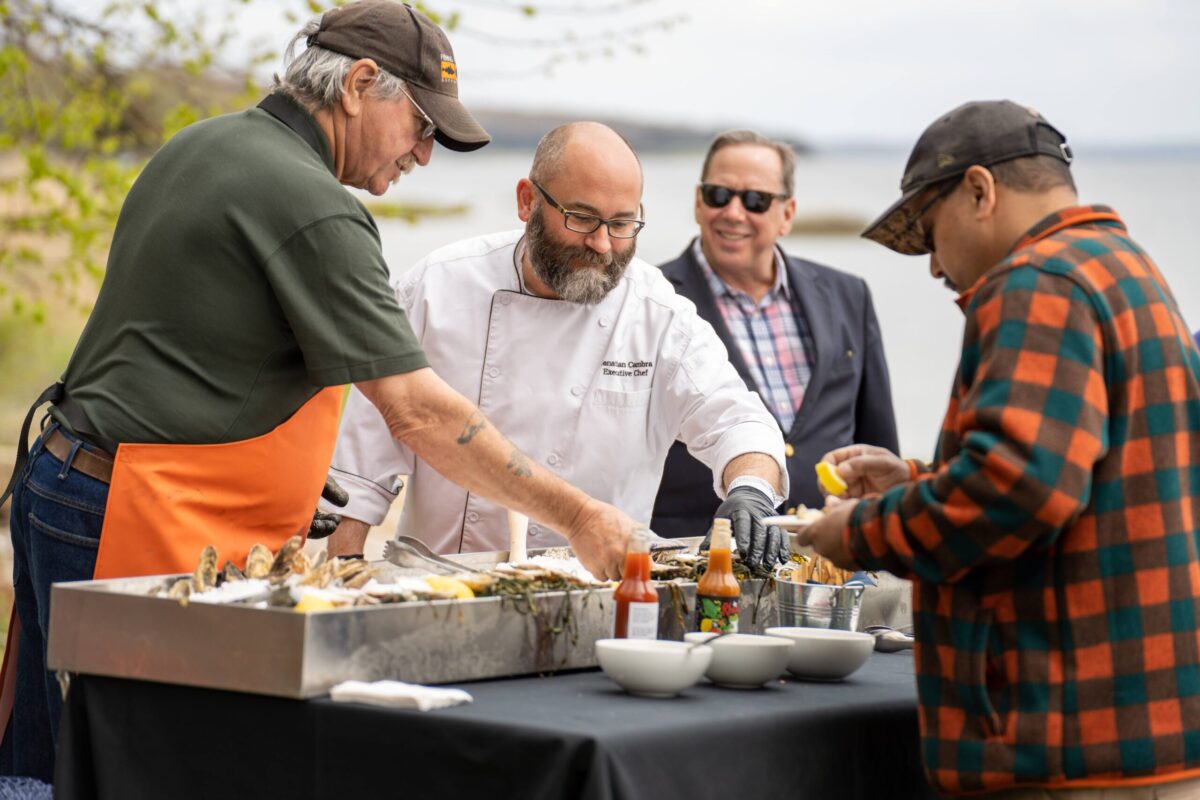Farm to Fork Profile: A Model for Local Sourcing at Rogers Williams University
- by Peter Todaro

From left, Professor Emeritus and shellfish farmer Dale Leavitt and Director of Culinary Operations Jonathan Cambra serve oysters at Roger Williams University while General Manager James Gubata looks on. Photo Credit: Stacey Pacheo/Roger Williams University
Thirty minutes south from the bustle of Providence, Roger Williams University in Bristol, Rhode Island overlooks Mt. Hope Bay, a waterway that opens to Narragansett Bay (New England’s largest estuary) and eventually, the North Atlantic Ocean. The picturesque coastal region is home to some of the nation’s most prized fishing and aquaculture grounds.
The Bon Appétit at Roger Williams team has built a leading local sourcing program here, bringing the best of the state’s cornucopia of seafood, produce, and animal proteins to campus. The team, led by General Manager James Gubata and Culinary Director Jonathan Cambra, works closely with a tight-knit group of Farm to Fork vendors, learning some valuable lessons along the way.
Nurturing Relationships with Small-Scale Producers
Some of Jon and James’ early partners – like DaSilva Farm, Blackbird Farm, and Cloverbud Ranch – are small-scale, pasture-based livestock and poultry farmers, who, at the time, didn’t sell much of their product through wholesale channels. “We recognized early on that the products we wanted were being produced by very small farmers,” says James. “By developing relationships, we helped to identify where and how to serve their products.” The team creatively menus products from each of the three farms, recognizing that the farmers may only want to wholesale certain products.
“DaSilva Farm can provide us with enough chicken for a meal one night per week,” says Jon. “And that’s a great arrangement for us and the farmer.” With Blackbird Farm and Cloverbud Ranch, communication occurs on a weekly and sometimes day-to-day cadence. “Ann Marie from Blackbird Farm will call and say, ‘we just left the processing facility,’” laughs James. “We usually get ground beef, but we also purchase top round and strip loins.”
The team uses what James calls “stealth menu planning and recipe design” to make plant-based foods the focus of many of their menus, while incorporating the high-quality animal proteins in smaller amounts. They accomplish this by offering concepts like a taco or quesadilla bar, where vegetable offerings are front and center, with meat being offered as a garnish on top. “As a company we’re trying to be more plant forward,” says James. “We still offer meat, and this is the best way to do it.”
“The key is creating strong personal relationships with your farmers and being flexible,” remarks Jon. “Farming is inconsistent by design and we adapt our menus accordingly. They know they can call or text me anytime.”
Local Food Hub Plays an Important Role
While the team works individually with farmers to bring local animal protein to campus, they leverage their partnership Farm Fresh Rhode Island (FFRI), a non-profit food hub based in Providence, to deliver a consistent stream of local produce and value-added products to campus. Through FFRI’s Market Mobile platform (which Jon has supported and given input to over the years), the team orders produce from over 70 local farmers through a streamlined e-commerce platform. “The Market Mobile platform is great because it allows farmers to set their own prices,” says Jon. “And as a chef, it allows you to easily compare prices for similar products and then place one order.”
The team relies on FFRI to provide regular deliveries of local produce, dairy, bread, maple syrup, and even specialty goods like vinegars, and honey. Beyond the benefit of having a convenient one-stop shop for these products, the team supports FFRI’s mission of “Increasing Community Access to Local Foods.” The non-profit operates five other programs, in addition to Market Mobile, including a production kitchen that trains high schoolers on how to transform B-grade produce into shelf-stable goods, a gleaning organization, as well a community education and farm-to-school organization.
Celebrating New England’s Local Seafood Economy
Roger Williams is known for its leading Aquatic Diagnostic Laboratory and shellfish program, which includes an on-campus shellfish nursery and farm. “We try to provide a complementary educational experience through the dining program,” says Jon. “We want to show them what the ecosystem has to offer.” The team follows the Monterey Bay Aquarium Seafood Watch program’s guidelines, which offer guidance on purchasing of sustainably produced or wild harvested species.
“Most of the seafood we serve comes within 150 miles of Roger Williams,” says Jon, an active commercial fisherman when he’s not overseeing the culinary program on campus. The team relies on a partnership with a local seafood distributor that aggregates the daily catch from small fisherfolk in Rhode Island (including Jon!). Students are treated to a range of New England seafood, including species like North Atlantic haddock, pollock, Acadian redfish, Narragansett Bay and Quahog clams, and of course, local oysters. “We trace where seafood comes from down to a single boat,” says James. “Jon even catches some of what serve – it’s a powerful story.”
By working with small producers, forming a strong partnership with FFRI, and bringing the best of New England seafood to campus, the team has developed a winning strategy at Roger Williams, with Farm to Fork scores consistently over 20% and a wealth of strong, longstanding partnerships around them. “This mission keeps me going as a chef,” says Jon. “We’re so proud to know we are supporting the people of the community, the people who put the food on our tables.”